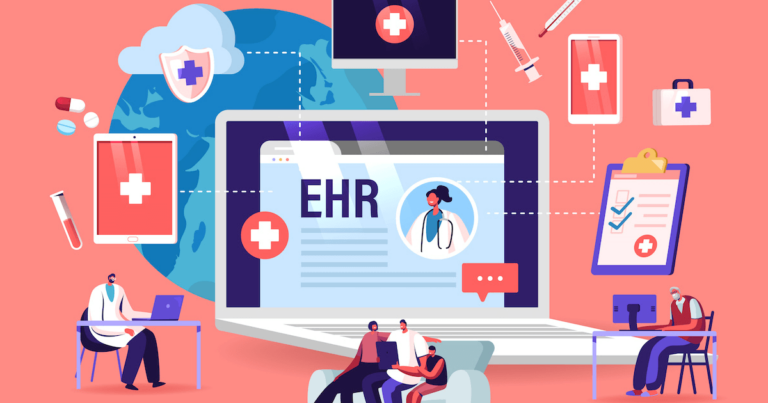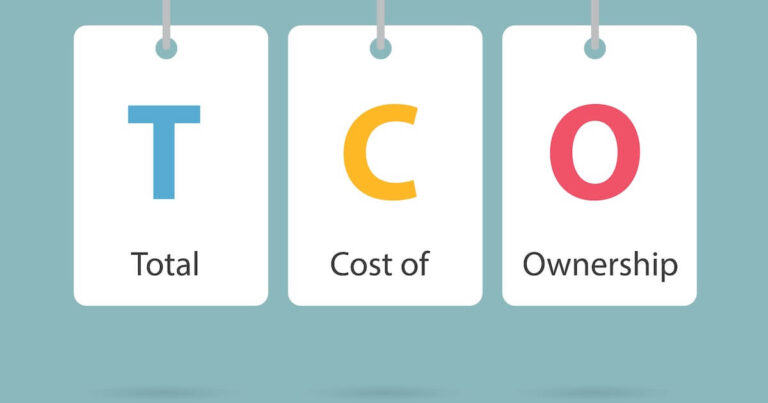Electronic health record (EHR) systems facilitate the workflow of healthcare institutions and improve the patient experience. These systems store and share patients’ critical medical information hence requiring robust solutions for data management. Besides that, compliance and security are yet other factors that need to be ensured to protect sensitive patient data and to be effortlessly operated within geographic regions based on applicable regulatory requirements.
As the EHR systems stand as a critical centralized healthcare component facilitating the workflow of medical staff, secure patients’ information, and provide high-quality services on-demand, building a robust, convenient, and secure healthcare tool is a true challenge. It requires thorough planning, integration with third-party systems, smooth data migration, and robust data security. Cloud computing solves healthcare’s greatest challenges with secure and trusted solutions. Before we deep dive into the top trends in EHR and how the cloud is the best choice to develop EHR, let’s understand the benefits cloud offers to healthcare providers.
Benefits of Cloud For Developing EHR Systems
“Clients continue to seek embedded workflow tools that will improve clinical, financial, and operational outcomes. Cerner technology, in collaboration with AWS, provides strategic levers that help enable these outcomes through enhanced interoperability and data management that will amplify better, smarter care.” – Jerome Labat, Executive Vice President, and Chief Technology Officer – Cerner
Several strong reasons are that cloud-based EHR is a popular choice for businesses. Here are the most significant advantages of cloud-based EHR solutions:
1. Convenient management
Unlike traditional IT, where you need dedicated staff 24×7 to look after the servers, cloud providers take over the responsibility and provide support and maintenance for your deployed solution on the cloud in a fast, easy, and effortless manner. It allows healthcare organizations to focus on patient care rather than juggling with installing and managing software.
2. Advanced scalability and flexibility
The cloud enables healthcare organizations to scale up their electronic health care systems and make them available to demand the required number of users. They can also configure the settings for the modules used and the amount of data storage.
3. Promote Mobility With Security
Cloud-based healthcare systems promote mobility with high-end security. With secure authentication, users can quickly log in to their devices, whether computers, tablets, or smartphones, enabling better workflow management and customer service.
4. Cost Savings
Cloud providers offer several licensing options for different functionality sets, making software development affordable for healthcare of all sizes and types.
Emerging Health Tech Trends In EHR With Cloud
Empowering EHR systems with core modules and features is a starting point for cloud enablement. New technologies are aspiring, promising to speed up processes and increase healthcare values and productivity. There are three major trends in healthcare bound to enhance the efficiency of your electronic healthcare records.
1. Analytics & Artificial Intelligence / Machine Learning
Once your EHR system becomes cloud-based, deploying analytics and machine learning tools becomes seamless. With cloud resources, it is highly convenient to derive insights from health data. With the cloud, you get AI services, natural language processing, and document understanding along with a comprehensive ML platform. Organizations with analytics and ML can easily address the gap within patient care, transform data into a strategic asset to deliver a better user experience, and reduce the rising cost of healthcare.
2. Blockchain
Many healthcare startups have already used blockchain to secure data and transactions and ensure privacy for protected health information (PHI). Blockchain uses timestamps to authenticate every change made to data, ensuring data authenticity and eliminating risks of data deception. It is also helpful in setting up an AI-based mechanism for speech and handwritten text. The blockchain-powered system ensures transparency and trust, making EHR a secure and convenient place to store generated prescriptions and other patient data.
3. Multiple Clouds
The Healthcare industry has been a critical sector, just like banking and finance, when it comes to maintaining security, compliance, and user experience. Multiple cloud deployment along with hybrid cloud solutions are now empowering healthcare to utilize cloud solutions. Whether it is the need for disaster recovery or ensuring resilience, even if the entire infrastructure of a single cloud fails, a multi-cloud system enables healthcare to continue operating. This advantage is particularly valuable for the healthcare industry and EHR solutions, where data security and integrity are top priorities.
Why Cloud Computing For Electronic Health Records?
A reliable, performant clinical system is the foundation of patient-centered care, delivering providers with the insights and tools to improve health outcomes. Cloud providers and partners help clinical teams leverage solutions that collect, store, manage and transmit health care data across the entire continuum of care to optimize cost, improve performance, and automate core processes to relieve physician burdens.
Cloud providers like AWS work closely with EHR to accelerate innovation around clinical, financial, and patient applications to make healthcare a more personalized experience – all in a secure environment that ensures patient data privacy. There are some benefits to employing cloud models and solutions for EHR, including:
1. Security and Regularity
Cloud solution provider provides solutions for storing, processing, or transmitting sensitive, protected healthcare data that meet and exceed global regulatory and compliance standards. For example, AWS offers more than 130 HIPAA-eligible services and certifications, including GDPR, ENS High, C5, HITRUST, and many others. What this means is you get a pre-built platform to develop and deploy your applications faster.
2. Interoperability
Interoperability is essential for establishing an effective clinical system. Cloud platforms offer support for FHIR, DICOM, HL7V2, and other healthcare API and integrations. This way, the cloud ensures information integrity and supports interoperability by allowing the transfer of health data between providers, irrespective of the software systems, data standards, exchange interfaces, and outputs involved.
3. Virtualization & Disaster Recovery
Solutions for IT challenges start with prevention. Datacenter failures, server corruptions, or cyber-attacks can impact your data, revenue, compliance, and patient and customer trust. Developing an EHR application or system with the cloud provides scalable, cost-effective business continuity solutions. It is easy to minimize downtime and data loss since the cloud ensures fast and reliable recovery of physical, virtual, and cloud-based servers.
4. High Availability & Fault Tolerance
Continuous availability of clinical applications is crucial for effective and safe healthcare services. Cloud ensures high availability as well as fault tolerance, which means the system will continue operating without interruption when one or more of its components fail. Implementing fault-tolerant systems allows systems to use backup components that automatically take the place of failed components, ensuring no loss of service and ensures high availability and business continuity.
Conclusion
EHR systems are vital for an efficient workflow in healthcare organizations. They must store tons of sensitive information securely and, at the same time, allow for fast and efficient management. Developing an EHR system as a cloud solution is the best way to ensure simple management, enhanced accessibility, and cost-efficiency.
Building a viable EHR system is challenging. This requires extensive experience in software development, in-depth research and planning, a deep understanding of the nuances of the healthcare industry, and the technical expertise of cloud computing.
At Successive Cloud, our dedicated specialists have helped AccuHealth with remote patient monitoring solutions by managing their real-time EHR data on the cloud as per healthcare industry norms, standards, and compliance. Read here how our team helped build a robust cloud-based EHR system while maintaining cost vs. performance balance.




